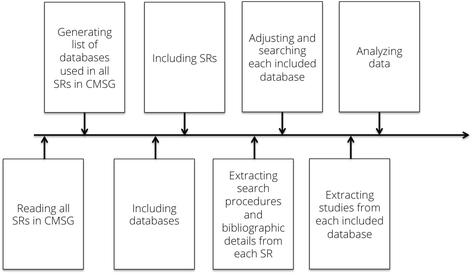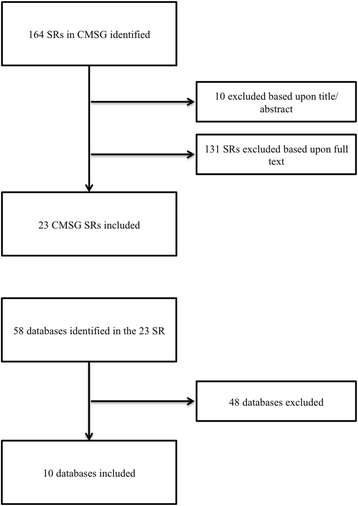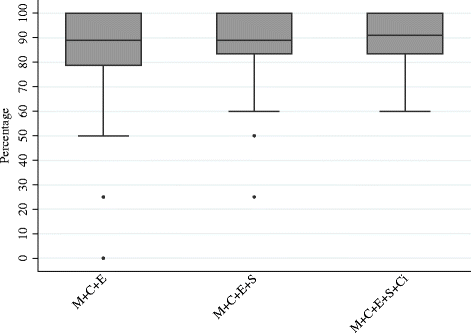Optimizing literature search in systematic reviews - are MEDLINE, EMBASE and CENTRAL enough for identifying effect studies within the area of musculoskeletal disorders?
- PMID: 27875992
- PMCID: PMC5120411
- DOI: 10.1186/s12874-016-0264-6
Optimizing literature search in systematic reviews - are MEDLINE, EMBASE and CENTRAL enough for identifying effect studies within the area of musculoskeletal disorders?
Abstract
Background: When conducting systematic reviews, it is essential to perform a comprehensive literature search to identify all published studies relevant to the specific research question. The Cochrane Collaborations Methodological Expectations of Cochrane Intervention Reviews (MECIR) guidelines state that searching MEDLINE, EMBASE and CENTRAL should be considered mandatory. The aim of this study was to evaluate the MECIR recommendations to use MEDLINE, EMBASE and CENTRAL combined, and examine the yield of using these to find randomized controlled trials (RCTs) within the area of musculoskeletal disorders.
Methods: Data sources were systematic reviews published by the Cochrane Musculoskeletal Review Group, including at least five RCTs, reporting a search history, searching MEDLINE, EMBASE, CENTRAL, and adding reference- and hand-searching. Additional databases were deemed eligible if they indexed RCTs, were in English and used in more than three of the systematic reviews. Relative recall was calculated as the number of studies identified by the literature search divided by the number of eligible studies i.e. included studies in the individual systematic reviews. Finally, cumulative median recall was calculated for MEDLINE, EMBASE and CENTRAL combined followed by the databases yielding additional studies.
Results: Deemed eligible was twenty-three systematic reviews and the databases included other than MEDLINE, EMBASE and CENTRAL was AMED, CINAHL, HealthSTAR, MANTIS, OT-Seeker, PEDro, PsychINFO, SCOPUS, SportDISCUS and Web of Science. Cumulative median recall for combined searching in MEDLINE, EMBASE and CENTRAL was 88.9% and increased to 90.9% when adding 10 additional databases.
Conclusion: Searching MEDLINE, EMBASE and CENTRAL was not sufficient for identifying all effect studies on musculoskeletal disorders, but additional ten databases did only increase the median recall by 2%. It is possible that searching databases is not sufficient to identify all relevant references, and that reviewers must rely upon additional sources in their literature search. However further research is needed.
Keywords: Bibliometric; Evidence-based medicine; Information retrieval; Literature searching; MECIR guidelines; Musculoskeletal area; Relative recall; Systematic review.
Figures
Similar articles
-
Database coverage and their use in systematic reviews regarding spinal manipulative therapy: an exploratory study.Chiropr Man Therap. 2022 Dec 19;30(1):57. doi: 10.1186/s12998-022-00468-8. Chiropr Man Therap. 2022. PMID: 36536437 Free PMC article.
-
Methodological developments in searching for studies for systematic reviews: past, present and future?Syst Rev. 2013 Sep 25;2:78. doi: 10.1186/2046-4053-2-78. Syst Rev. 2013. PMID: 24066664 Free PMC article.
-
Cochrane Centralised Search Service showed high sensitivity identifying randomized controlled trials: A retrospective analysis.J Clin Epidemiol. 2020 Nov;127:142-150. doi: 10.1016/j.jclinepi.2020.08.008. Epub 2020 Aug 13. J Clin Epidemiol. 2020. PMID: 32798713
-
Search strategies to identify observational studies in MEDLINE and Embase.Cochrane Database Syst Rev. 2019 Mar 12;3(3):MR000041. doi: 10.1002/14651858.MR000041.pub2. Cochrane Database Syst Rev. 2019. PMID: 30860595 Free PMC article.
-
Defining the process to literature searching in systematic reviews: a literature review of guidance and supporting studies.BMC Med Res Methodol. 2018 Aug 14;18(1):85. doi: 10.1186/s12874-018-0545-3. BMC Med Res Methodol. 2018. PMID: 30107788 Free PMC article. Review.
Cited by
-
Overlaps of multiple database retrieval and citation tracking in dementia care research: a methodological study.J Med Libr Assoc. 2021 Apr 1;109(2):275-285. doi: 10.5195/jmla.2021.1129. J Med Libr Assoc. 2021. PMID: 34285670 Free PMC article.
-
Database coverage and their use in systematic reviews regarding spinal manipulative therapy: an exploratory study.Chiropr Man Therap. 2022 Dec 19;30(1):57. doi: 10.1186/s12998-022-00468-8. Chiropr Man Therap. 2022. PMID: 36536437 Free PMC article.
-
Methodological quality of systematic reviews in dentistry including animal studies: a cross-sectional study.Ir Vet J. 2023 Dec 14;76(1):33. doi: 10.1186/s13620-023-00261-w. Ir Vet J. 2023. PMID: 38098065 Free PMC article.
-
Diagnosis, prevention and treatment of common lower extremity muscle injuries in sport - grading the evidence: a statement paper commissioned by the Danish Society of Sports Physical Therapy (DSSF).Br J Sports Med. 2020 May;54(9):528-537. doi: 10.1136/bjsports-2019-101228. Epub 2020 Jan 14. Br J Sports Med. 2020. PMID: 31937579 Free PMC article. Review.
-
Development and validation of a MEDLINE search filter/hedge for degenerative cervical myelopathy.BMC Med Res Methodol. 2018 Jul 6;18(1):73. doi: 10.1186/s12874-018-0529-3. BMC Med Res Methodol. 2018. PMID: 29976134 Free PMC article.
References
-
- Gray JAM, Booth A, Booth S, Ison E. Evidence-based healthcare. Edinburgh: Churchill Livingstone; 2001.
-
- Higgins JPT, Green S. Cochrane Handbook for Systematic Reviews of Interventions. Chichester: John Wiley & Sons; 2008.
MeSH terms
LinkOut - more resources
Full Text Sources
Other Literature Sources




